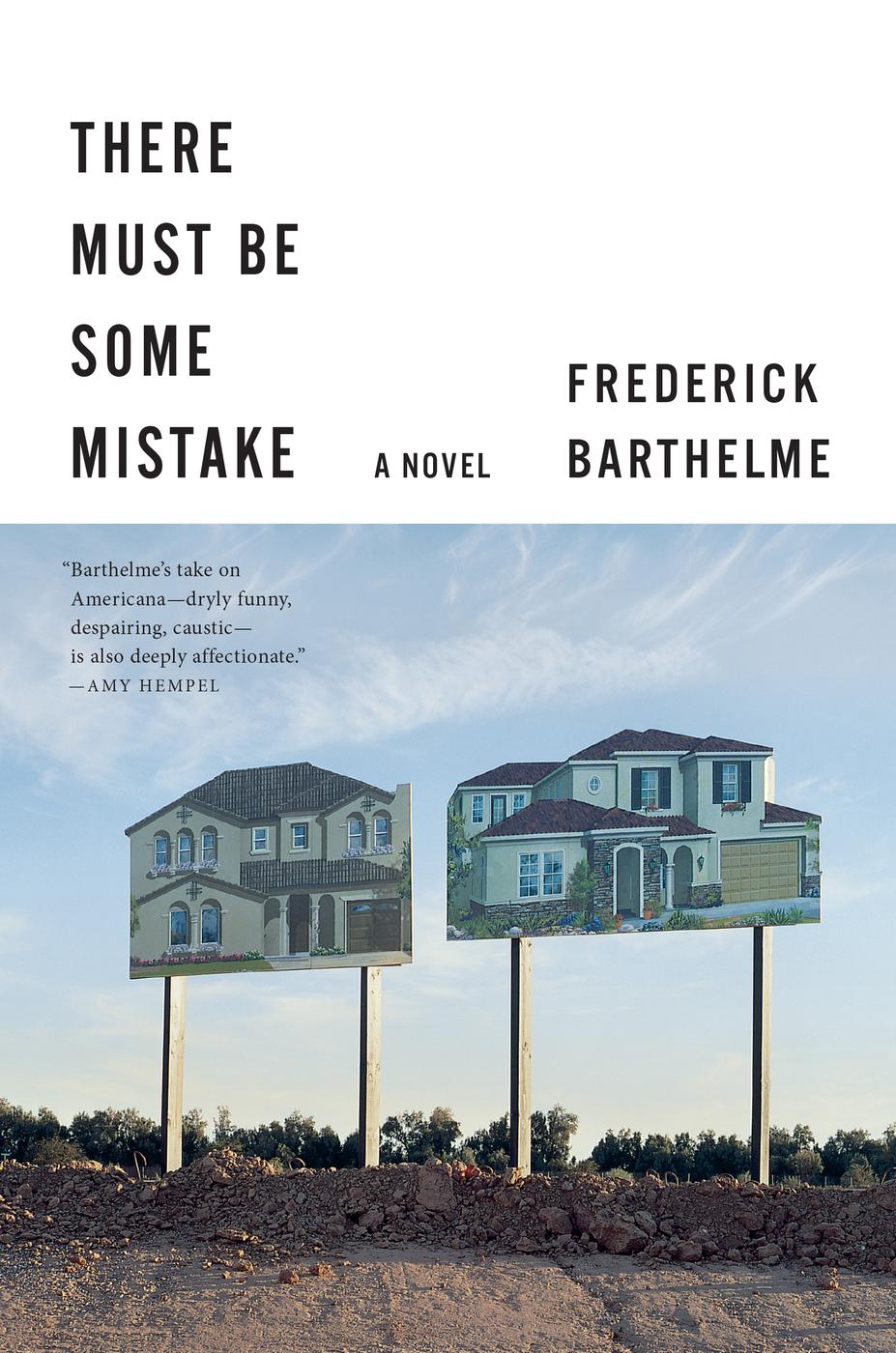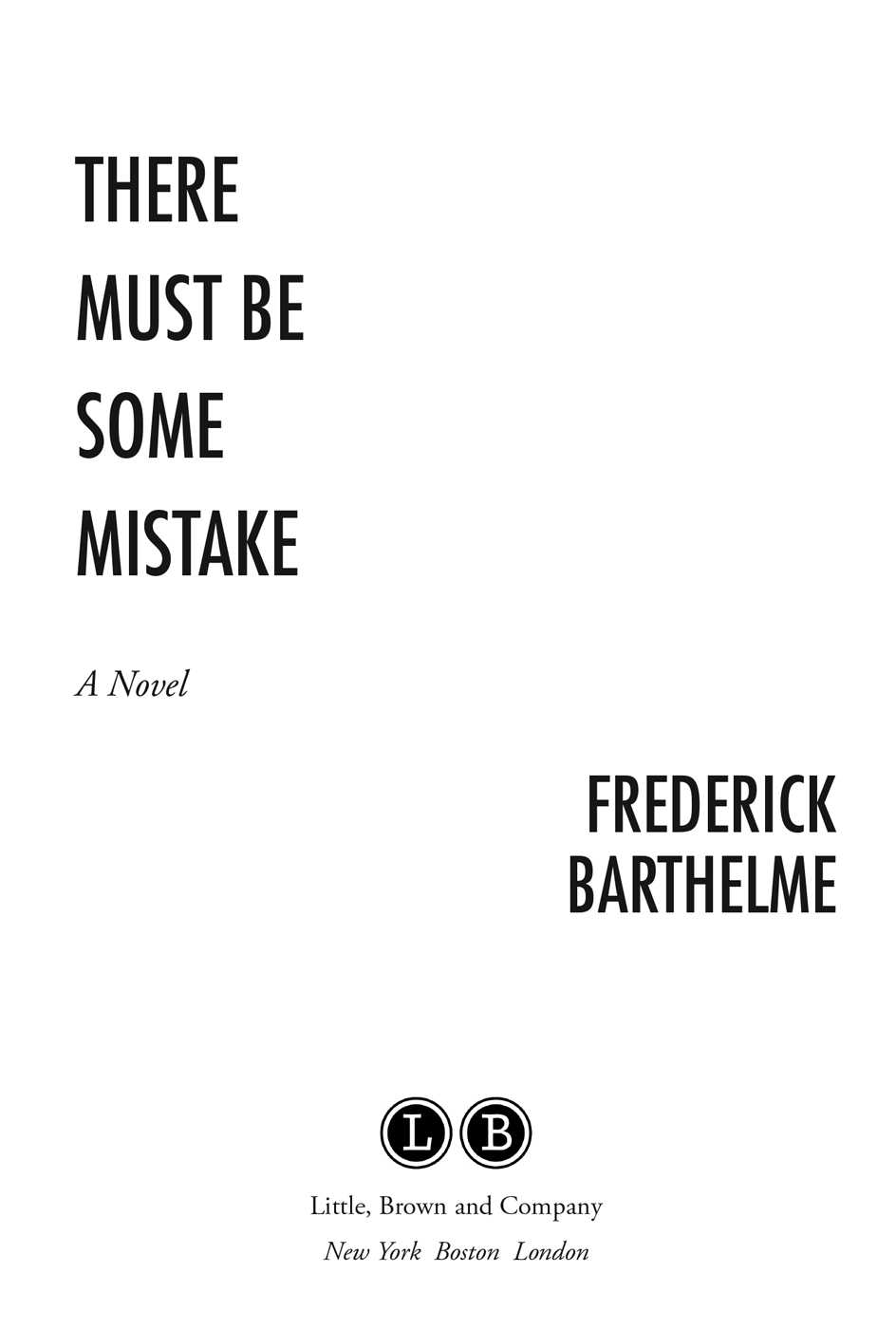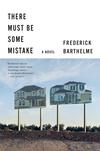There Must Be Some Mistake
Read There Must Be Some Mistake Online
Authors: Frederick Barthelme




In accordance with the U.S. Copyright Act of 1976, the scanning, uploading, and electronic sharing of any part of this book without the permission of the publisher constitute unlawful piracy and theft of the author's intellectual property. If you would like to use material from the book (other than for review purposes), prior written permission must be obtained by contacting the publisher at [email protected]. Thank you for your support of the author's rights.
For Joan
AT THREE
in the afternoon I woke up and there was Jilly Rudolph out on the deck flipping through the local paper. She was a woman from my former office, midthirties, lanky, charming, a friend who had stuck with me when I was jettisoned from the design business. And she liked me, which made her a special favorite. She'd had a short and lousy marriage in her twenties and hadn't gone back to the altar. I was two decades older, widowed once, divorced once, and a partner at Point Blank Design, at least until the others decided I was past my use-by date and sent me into Neverland with a silver plate and some fine sentiments about my thirty years of service. To say I was shocked would understate it. You do something that long and you figure you've probably made the cut. But the new and the young are relentless, and will have their way. So it is written.
I was living in Kemah, halfway between Houston and Galveston, and working from home a lot, so I repaired to the condo to lick my wounds and figure out what might be the next move. I'd lived there since the last years of my second marriage, so it was comfortable enough, even if I wasn't. I didn't fish or hunt, I didn't collect stamps or books or baseball cards, I didn't cook, garden, or build model airplanes, so when they let me go I was, to say the least, at a loss. I suppose I could have looked for work at another shop, but I felt a little long in the tooth for that, and I had a decent safety net, so I did nothing, and doing nothing I was very pleased that Jilly made a habit, after my embarrassing fall from grace, of visiting more often than I'd imagined she might. She was a quiet woman, kind of stoical, wry, what people call
older than her years.
We had been close at the office and were closer now. I was grateful. That, too, understates the thing.
I went out onto the deck and gave Jilly a hug, settled into the chair next to hers. Even with the sun surrounded by clouds it was way too bright.
“Visiting the halt and the lame?” I said.
“Per usual,” she said, closing the paper and sliding it my way. “An act of mercy for which I reap great wealth and beauty in the next life. You, on the other hand, reap disreputableness.”
“I'm fine,” I said, sticking a hand through my hair. “It's only my hair. It's waking up. We went to bed at seven.”
“How glamorous,” she said. “You must be refreshed by this hour.”
“I missed you,” I said. “I do every time you go home. Didn't you just go home a couple days ago? Not to be forward.”
“I did,” she said. “To carry out my responsibilities. To spy on your former employersâmy current employersâwhile living it up with them and our other friends in the big town. All the while clinging to a paycheck.”
“And I missed you while you were gone. Did I say that already?” I said.
“You did. Thanks,” she said. “I found a kid who writes code. He's sweet and ridiculously young. In the teen area.”
“Attractive?”
“In the little-brother way, yes,” she said. “What's news?”
“My neighbor, Forest Ng, died in a car crash,” I said. “His name is spelled âNg' but pronounced âEng'âI looked it up.”
“Everybody knows that,” she said.
“I liked him. He crashed his car over by one of the marinas. In the early morning hours. A âshots rang out' thing.”
She tapped the paper. “If there's a picture in here, I didn't see it.”
“It was, apparently, a completely accidental car accident.”
This was March, still bearable out. Jilly was in jeans and a white button-down shirt and wore a scent that made the world around her seem wonderful and mysterious. I couldn't help feeling lucky. In the waning days of my tenure at the design shop she was what made it worthwhile.
The dead neighbor was a guy I talked to from time to time. He'd recently bought the condo next to mine, moved in with a herd of people, so many I couldn't figure out who went with whom. There were seven adults in the houseâthree men, four womenâall between twenty-five and forty-five. One time Ng said they were relatives; another time he said they were coworkers in his nail salons. He said he had salons in Kemah, Seabrook, Texas City, Beaumont, Sugar Land, and Waikiki.
Waikiki? I said.
Kid you not, he said.
Together they had seven Mercedes-Benzes, all black, and not the cheap ones, either, for which there was insufficient parking, so the cars ended up in the yard, in my driveway, in the carefully tended green space.
“He struck a curb,” I said. “Then he hit a building, flipped the car, busted a hydrant, landed upside down in the culvert. And the whole thing burst into flames,” I said. “It was on TV at five
A.M.
this morning.”
She picked up her water bottle and shooed a gnat away from her hair. “Get away,” she said. “I remember you whined about the cars. You were intimidated by the cars.”
“Well, maybe. But I did not whine. Not once. I asked him to keep them on his property. He was friendly about it. I liked him. He was a Mac person. We were pals.”
“You don't have so many pals, usually.”
“I'm trying to change my ways,” I said. “It's your influence. Interacting with other human beings is therapeutic.”
“Duh,” she said.
“He made a fortune in mani-pedi,” I said. “If the cars mean anything.”
She shook her head. “They don't. Probably leased. Besides, you think everybody made a fortune.”
“True,” I said, swatting my hair again, both hands this time. “You look very very pretty today.” Kathy Najimy's old routine.
She just nodded at that. “Good one,” she said.
I liked Ng because he was straightforward about lying to me. He exaggerated everything. He had houses in three cities, he did Bill Clinton's toes one time, he bought an eighty-inch flat-screen television to watch American football, his yard guy was nine hundred a month and was the brother of a Green Bay Packers running back. Ng was small and wiry, and he gestured like a maniac when he complained about the neighborhood. One night he brought me a pork chop he had cooked “Oulipo style.” One of the women was probably his wife, but I was afraid to ask which one.
My neighbor on the other side talked too much and wasn't so interesting. He was like a cook on a ship in a fifties Navy movie, except unnecessarily cheerful. He'd moved down from Clifton, New Jersey, and he was working on a miniature perpetual-motion engine in his garage. It was “scalable,” he assured me. His name was Bruce Spores. Told me he was a Yale grad and he was rated as the fifth-smartest male in the country back in the eighties. He took an exam, won an award. The thing was, his brother was even smarter, ranked fourth smartest.
“You are a couple of smart cookies,” I said when he told me about it.
He shook his head and grinned. He was always grinning. I wanted to ask him how he scored on modesty.
Roberta Spores was a short, thick woman with lots of ideas about what was needed to make Forgetful Bay Condominiums a more prestigious address. She had eyes on the leadership of our homeowners' association.
“Ng was OK,” I said. “He always talked about money. How much he paid for the new triple-zone heat pump he had installed in his condo. He had a thing.”
“Who doesn't?” Jilly said. She picked up the paper and opened it. “I'm going to look.”
“I don't advise it,” I said.
 Â
My first wife, and the mother of my daughter, Morgan, was Lucy Meringue, a lovely woman, a singer who died of throat cancer seven years after we married. The last months were a horror.
Years later I met Diane and we got married and bought a house in Houston, but after a time Houston got too ugly and crowded and we started looking for something quieter.
We rented a place in Kemah and I worked from there, going up to Houston maybe twice a week. Diane suggested we make it permanent, so we bought the condo. We were fine for a couple years. Morgan was four when her mother died, eight when Diane and I married. All the parenting after her mother's death was done with a light touch because Morgan was the best kid in the world. We were so lucky. She was a quick learner, self-motivated, interested in everything, so smart she almost raised herself. Real magic.
After ten years with Diane the marriage was belly up and we divorced. Amicably. I got the condo; she got the house in Houston. Morgan stayed with me in Kemah. She was finishing high school, going through college brochures and websites, sending letters of inquiry, making applications, planning what she might study. We talked about it often. She was thinking architecture, which was my father's profession and something she'd always liked. Watching her mature was staggering just as it's said to be and changed everything for me. One world ended. Another began. Toward the end of high school she was as much friend as daughter. For college she chose Rice University, and I was relieved she wasn't going farther.
Diane's father died a couple years after the divorce, and she moved to Rhode Island and took on his estate. He was a hugely successful doctor, so she was well taken care of. We kept in touch, and from what I could gather she spent most of her time volunteering for good causesâsmall museums and animals, mostly dogs. The dogs she did in person, the museums by checkbook. And there were elephants. She had a thing about them. We got along better at the new distance.
 Â
Jilly would visit, we'd go to dinner or the beach or shopping at Walmart, sometimes a movie during the day when the theaters were empty. Once she couldn't get a motel because of the boat show, so she stayed at the condoâall perfectly proper. It wasn't strained or uncomfortable, so it became routine. At the office she'd always been pleasant, delivering a wry, playful commentary about our work that I liked, and she was a help during the divorce. She was fun, and having her visit was flattering, and if sometimes in my head there was a thought of what might have been, or what might be, more often I was realistic and simply happy to have the company. Her presence brightened everything.
I was a night person, so usually up until first light, sleeping into the afternoon. I liked the silence, the quiet of night, but also the idea that after two or three
A.M.
nobody else had anything to do, either.
 Â
The condo was up on concrete pilings sunk a good distance into the ground and chock-full of rebar. It had been hurricane-proofed and then some. On the east was Galveston Bay, Trinity Bay, and the Houston Ship Channelâall one huge body of water opening, farther south, into the Gulf. Along the bay there was a rundown coast lined with all the seedy charm an old body of water like that will breed at its edges. To the south were the refineries of Texas City, and eventually Galveston Island, and to the west was Clear Lake and the enormous NASA empire that had kudzued the entire area.
When I was a kid Kemah was dinky and charming, but it had been developed with an elaborate boardwalk, shopping mall, multiscreen cinema, amusement park, “resort-style” hotel, and, of course, a roller coaster, without which a vacation destination cannot apparently be imagined. The whole town was spectacularly kitschy. We still had that high bridge over the inlet to Clear Lake, so elegant and lovely in the late afternoons, but almost everything else belonged to a world where people didn't know how to leave well enough alone. It got better as you got out of town and down by the condo, which was a bit south; we were lucky. The development was done by a Galveston architect, a woman who had some sense of place, so the design was restrained. Each condo had a tiny bit of ground around it and was situated in a way that made the most of the views of Galveston Bay, which didn't look bad from a distance. A few older houses were scattered around us, but they were low and we looked over their tops. There were two dozen condos, all similar, and another couple dozen semidetached cottages built around a little lake on a few acres between Highway 146 and the bay. My place was three bedrooms, four if you counted the den, with wraparound decks so I got sunrises over the bay, sunsets to the west. The cottages were at the south end by the lake, which was called Smoky Lake because it was. Maybe four acres of water, maybe five when swollen in its banks.
A thin blacktop road wiggled through the place. We had a homeowners' association, so there was some upkeep for the trees and grass, and there was a path that went down by the seawall. Sometimes we envied the fancy high-rises over in Clear Lake, and sometimes we envied the more authentic world of hurt down in Texas City, a refinery town, but the envy was largely rhetorical in both cases.
“It's a tub,” she said. “A brown-water bathtub.”
It was a bay, after all, not the Gulf. But we sat there and listened to the sloshing and slight lapping, the seagulls, the wind shifting through the trees that leaned around the buildings at Forgetful Bay. It wasn't that bad.
“We are lucky,” I said. “We got it easy out here. Just right for an old guy.”
“Oh, quit that,” she said. “You're barely sixty.”
“Not funny,” I said.
“Sorry. What are you, fifty-something? Women love men your age. You're just right for those among us who tend to the woeful and the downtrod. We serve at your pleasure.”
I nodded. “For which I am grateful.”
“I am the beautiful stranger,” Jilly said.
The name of a wonderful book I'd given her years before, and exactly how I thought of her. “So fetch me another beer, will you?” I said, squinting at her long enough for her to imagine I wasn't joking.
“You need a nap,” she said, getting out of her chair. “Me, I am going out. I am a young person on the go. When I return we will visit one of our finer eateries. Say, Wendy's.”
“Way to plan things,” I said.
“I'm all about the Frosty,” she said.